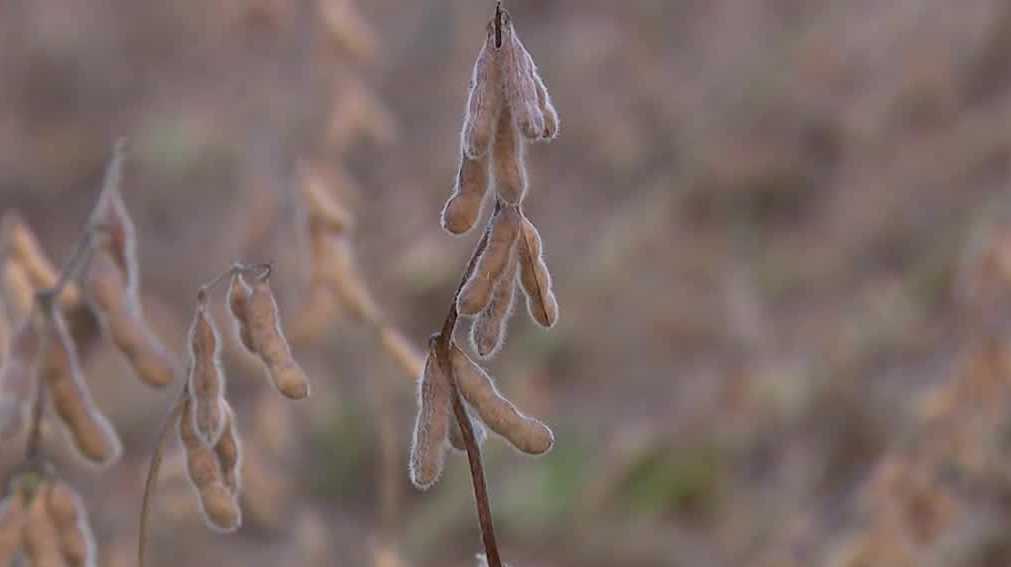WITH THE HARVEST RIGHT AROUND THE CORNER. SO YOU’VE BEEN DOING THIS? HOW LONG? I’VE BEEN FARMING MY WHOLE LIFE. DOUG REBOOT’S FARM, JUST OUTSIDE OF JANESVILLE, HAS BEEN IN THE FAMILY FOR DECADES. MY MOM AND DAD BOUGHT IN 63. I’M 57 YEARS OLD. SO, LIKE I SAID, I’VE BEEN HERE FOR 57 YEARS. CORN, WHEAT AND SOYBEANS COVERED THE THOUSANDS OF ACRES OF THE FARM’S LAND. BUT IT’S THOSE SOYBEANS KEEPING HIM UP AT NIGHT. AFTER CHINA STOPPED BUYING FROM AMERICAN FARMERS, A MOVE SEEN AS RETALIATION FOR TRUMP ADMINISTRATION TARIFFS. COULD YOU CALL IT A CRISIS? IT IS A CRISIS NOW. CHINA HAS BOUGHT MORE SOYBEANS THAN THE REST OF THE WORLD COMBINED. CHINA, OF ALL THE US, SOYBEANS EXPORTED, CHINA BUYS TYPICALLY OVER 60 TO 63% OF THE SOYBEANS. THE SOYBEAN INDUSTRY’S LARGEST CUSTOMER. GONE. AND THE IMPACTS ARE ALREADY BEING FELT. PRICES ARE DROPPING AT A TIME WHEN OTHER COSTS ARE GOING UP. OUR PRICES FROM THREE YEARS AGO HAVE DROPPED $5 A BUSHEL. AND HERE ON OUR FARM, WHERE WE GROW 80,000 BUSHELS THIS YEAR, THAT’S A $400,000 ECONOMIC IMPACT JUST TO OUR FARM ALONE. NOW, THIS SECTION OF THE FARM IS ONLY ABOUT 15 ACRES OF THE GRAND TOTAL, 1200 ACRES OF SOYBEAN CROP, ALL OF IT SET TO BE HARVESTED BY EARLY NEXT WEEK. REBOOT, WHO ALSO SERVES AS THE PRESIDENT OF THE WISCONSIN SOYBEAN ASSOCIATION, SAYS THIS YEAR’S HARVEST IS SET TO BE A SURPLUS AT A TIME OF DECLINING DEMAND. WE’RE GETTING ALL THESE EXTRA SOYBEANS, NOWHERE TO SELL IT. REPORTING IN JANESVILLE T.J. DYSART, WISN 12 NEWS. THE PRESIDENT, ACKNOWLEDGING THE IMPACTS ON FARMERS IN A POST ON TRUTH SOCIAL TODAY, SAYING IN PART, QUOTE, WE’VE MADE SO MUCH MONEY ON TARIFFS THAT WE ARE GOING TO T
Soybean farmers face crisis as China halts purchases amid trade war
One Wisconsin farmer said China typically purchases more than 60% of the United States’ yearly soybean production.
Wisconsin soybean farmers are facing a crisis as China, their largest buyer, has stopped purchasing American soybeans in retaliation for tariffs imposed by the Trump administration, leading to plummeting prices and surplus crops. Doug Rebout, whose farm is located just outside of Janesville, has been farming his whole life and is now dealing with the fallout of this international trade war.”My mom and dad bought it in ’63. I am 57 years old, so I have been here 57 years,” Rebout said, reflecting on the history of his family farm, which spans thousands of acres and grows corn, wheat and soybeans.The halt in purchases by China, which typically buys 60 to 63% of U.S. soybeans, is causing significant economic impacts. Rebout said that prices have dropped five dollars a bushel compared to three years ago, resulting in a $400,000 economic impact on his farm alone, which produces 80,000 bushels annually.Rebout, who also serves as the president of the Wisconsin Soybean Association, explained that this year’s harvest is set to be a surplus amid declining demand. “We are getting all of these extra soybeans, and we have nowhere to sell them to,” Rebout said.With the harvest set to be completed by early next week, farmers like Rebout are left grappling with the challenges of a surplus crop and plummeting prices.The president acknowledged the impacts on farmers in a post on Truth Social, stating, “We’ve made so much money on tariffs that we are going to take a small portion of that money and help our farmers.”
Wisconsin soybean farmers are facing a crisis as China, their largest buyer, has stopped purchasing American soybeans in retaliation for tariffs imposed by the Trump administration, leading to plummeting prices and surplus crops.
Doug Rebout, whose farm is located just outside of Janesville, has been farming his whole life and is now dealing with the fallout of this international trade war.
“My mom and dad bought it in ’63. I am 57 years old, so I have been here 57 years,” Rebout said, reflecting on the history of his family farm, which spans thousands of acres and grows corn, wheat and soybeans.
The halt in purchases by China, which typically buys 60 to 63% of U.S. soybeans, is causing significant economic impacts.
Rebout said that prices have dropped five dollars a bushel compared to three years ago, resulting in a $400,000 economic impact on his farm alone, which produces 80,000 bushels annually.
Rebout, who also serves as the president of the Wisconsin Soybean Association, explained that this year’s harvest is set to be a surplus amid declining demand.
“We are getting all of these extra soybeans, and we have nowhere to sell them to,” Rebout said.
With the harvest set to be completed by early next week, farmers like Rebout are left grappling with the challenges of a surplus crop and plummeting prices.
The president acknowledged the impacts on farmers in a post on Truth Social, stating, “We’ve made so much money on tariffs that we are going to take a small portion of that money and help our farmers.”

